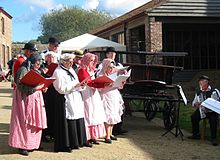- Music of the Channel Islands
-
The Channel Islands are located in the English Channel, by Normandy, France. The two bailiwicks, Guernsey and Jersey, are not a part of the United Kingdom, but since the 20th century are majority English-speaking and part of the British cultural sphere. They also share a historic cultural (and musical) identity with the people of Normandy.
Little is known of the history of music in the islands. The Reformation brought Calvinism to the islands and the later strong influence of Methodism suppressed dancing and secular music. A number of traditional songs and dances have been recorded, although some gentrified dances were collected in the 19th century in Guernsey. Some traditional folk songs such as Jean, Gros Jean and J'ai pèrdu ma femme (Jèrriais)/J'ai perdu ma faumme (Dgèrnésiais) have survived. Periodic fieldwork by collectors such as Peter Kennedy (1957; 1960), Claudie Marcel-Dubois (Sark, 1972) and Martin J. Locke (Sark, 1976) revealed a number of folk songs which were mostly in French, with parallels or variants also present in the folk traditions of France and French-speaking Canada. There were a smaller number of songs in Jèrriais, Dgèrnésiais, Sèrtchiais and English.
The traditional musical instrument most associated with the islands was the chifournie. According to Edith Carey (1903), it had disappeared from Guernsey by the mid-nineteenth century. It was to disappear from Jersey by the early twentieth century (see Frank Le Maistre: "Dictionnaire jersiais-français", 1976). Fiddle and accordion playing persisted for somewhat longer.
Dances included the "ronde", or round dance, the cotillion, and popular nineteenth-century dances such as the waltz, schottisch and polka. "La Danse des Chapieaux" (the hat dance) was a popular game of forfeit, while "La Bérouaisse" (the broom dance) was a display of agility by a solo dancer. "La Bébée" ("the Baby Polka" or "Klatschtanz") is a 19th century novelty dance which also remains popular with costumed folklore groups in various parts of Europe.
The development of tourism in the 19th century brought a demand for dance music in tea-rooms and hotels. Some local composers supplied songs and sheet music aimed at a tourist market.
Claude Debussy composed part of La Mer in Jersey. John Ireland settled for a time in Guernsey.
The Channel Islands Music Council was founded in 1974 to promote music in the islands. In 2004, the Jersey Live Music Festival was first held, now scheduled annually.
See also
Categories:- British music
- Channel Islands
- Jersey culture
- Guernsey culture
- Norman music
Wikimedia Foundation. 2010.

